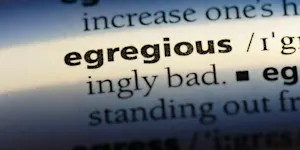What Makes This Word Tick
"Analogous" might sound like a mouthful, but it's really just a fancy way of saying two things are similar in some way. It's like when your nephew insists that your prized cheesecake recipe is "just like store-bought" – both might be cakes, but only one deserves the holiday spotlight.
If Analogous Were a Person…
Imagine "Analogous" as your suave cousin who’s the life of the party. Always drawing connections between people and ideas, he's there to remind everyone how two seemingly unrelated things can actually have a surprising common ground, like peanut butter and pickles, or jazz music and math.
How This Word Has Changed Over Time
Originally from the Greek "analogia," the word has stuck around for centuries, making small talk over tea about the improbable relationships it defines. Once a favorite among scholars and philosophers, it now casually rubs elbows with writers and everyday conversationalists alike.
Old Sayings and Proverbs That Use Analogous
While there aren't ancient proverbs that specifically use "analogous," the idea of showing similarity is common. Think of phrases like "peas in a pod" or "cut from the same cloth," which paint pictures of similarity and likeness, much like "analogous" does in fancier terms.
Surprising Facts About Analogous
You might be surprised to learn that "analogous" isn't just for words. In biology, analogous structures are different species’ parts that serve similar functions – like a bird’s wing and a butterfly’s wing. They evolved separately but have a similar job – flying high with flair!
Out and About With This Word
Spotting "analogous" in the wild isn't difficult if you know where to look. Think scientific studies or literary critiques. Wherever there’s a need to elegantly draw a parallel, "analogous" often comes in, putting on the ritz with all the pomp and circumstance it can muster.
Pop Culture Moments Where Analogous Was Used
Close your eyes and think of any detective show where they say, "It’s analogous to our previous case!" Bringing dramatic flair to TV, "analogous" gets thrown around when the plot demands a flash of deductive genius, proving it’s not just a bookworm’s pet but a screen regular too.
The Word in Literature
In literature, "analogous" likes to hang out in criticisms or between the lines of descriptive passages. It's often the unsung hero in essays comparing characters or setting the stage for sophisticated plot parallels, showing writers are much more than mere scribes – they’re architects of comparison.
Moments in History with Analogous
Think of the Cold War when leaders declared events in different countries "analogous" to each other, drawing symbolic parallels to influence public opinion. History is dotted with moments where cunning comparisons were drawn to shape strategy or sway the crowd.
This Word Around the World
In various languages, the concept of analogy and likeness pops up often. Whether it's "analogo" in Spanish or "analogue" in French, the idea travels well. While not direct translations, gestures and idioms worldwide battle to capture the same concept with their own local twists.
Where Does It Come From?
It traces its lineage back to ancient Greek, specifically "analogia," which meant proportion. Like a historical game of telephone, it passed through Latin as "analogus" before cozying up in English vocabulary, sometimes ditching the lofty circles for more casual company.
How People Misuse This Word
"Analogous" occasionally finds itself in the wrong company at the comparison party, mistreated as a synonym for "identical" by mistake. Remember, just because two things are alike in function doesn’t mean they’re twin peas in a pod!
Words It’s Often Confused With
Identical: This implies being exactly the same, while "analogous" means similar, but not necessarily the same.
Similar: "Similar" is broader, covering both similarities and differences, whereas "analogous" focuses on functional similarities.
Equivalent: This suggests equal value or function, whereas "analogous" suggests likeness in form or function without equality.
Additional Synonyms and Antonyms
Similar terms include comparable, akin, and parallel, while antonyms encompass dissimilar, different, and unlike – all useful for those never-ending word games with your grandchildren.
Want to Try It Out in a Sentence?
Sure thing! "The way he organized his garage was analogous to a well-played game of Tetris – despite the chaos, everything had its perfect spot."
















